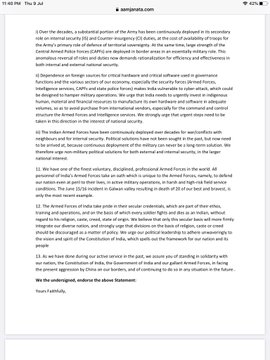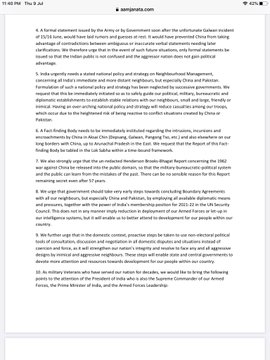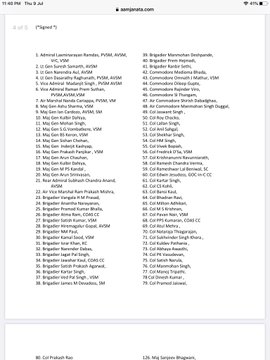Revamp intelligence service and seek political solutions says former Indian military officers
144 former Indian military officers has wrote an open letter to Indian government
The former officers have made it clear in the open letter
that none of them belonged to any political party. They said that "the
loss of twenty Jawans, including the CO, Colonel Santosh Babu, on June 15/16 in
the Galwan valley is deeply disturbing and raises many questions".
This open letter is significant in the sense that it shows
the concerns that not only exist among the former military officers but also
among the serving ones. There are concerns among the military about handling of
Galwan Valley clashes with Chinese military by the Modi government. The letter
also expressed concern about the increased involvement of Indian army in the
internal conflicts including Indian occupied Kashmir and North Eastern states.
The open letter claimed that intelligence failure could have
been the biggest reason for the Galwan Valley standoff that killed 20 Indian
soldiers. "While we accept that failures can happen in any system, in the
current instance either our intelligence system was found wanting, or the
intelligence which it obtained did not reach the field units in time," the
letter said while urging the government to revamp the intelligence system.
The open letter also stated that the Centre and the Indian
Army should have issued a formal statement about the Galwan clash to end
rumours and speculations. "We therefore urge that in the event of such
future situations, only formal statements are issued so that the Indian public
is not confused and the aggressor nation does not gain political
advantage," it read.
The military veterans urged the Centre to constitute a
fact-finding body to investigate the incursions and encroachments by the PLA in
Aksai Chin, Ladakh, and Arunachal Pradesh and along the Tibet border, adding
that the report should be tabled in the Lok Sabha in a time-bound manner.
The most important part of this letter is about seeking the
political solutions to internal and external disputes and security issues. The open letter urged the Centre to stop the
overdependence on the Army for maintaining internal security, clearly hinting
at the Army's active role in curbing militancy in Kashmir and the North East.
Moreover, it also pointed out that CAPFs, that is the paramilitary, were
deployed in border areas that needed to be under the Army's charge. The open
letter, thus, demanded a rationalisation of the policy.
However, in a more significant statement, the ex-servicemen urged
the Modi government to focus on finding a political solution for India's
external and internal security matters. Indirectly, they meant that India
should find a diplomatic solution to the Jammu and Kashmir and the LAC issue
and resolve the insurgency in the North East and the jungles of Central India,
i.e., Naxalism, by involving all political stakeholders.
"Political solutions have not been sought in the past,
but now need to be arrived at, because continuous deployment of the military
can never be a long-term solution," they said.
The open letter stated that India would need a national
policy and strategy on dealing with the immediate Neighbourhood as well as
distant nations. It added that successive governments ignored the formulation
of such a policy.
"Having an over-arching national policy and strategy
will reduce casualties among our troops, which occur due to the heightened risk
of being reactive to conflict situations created by China or Pakistan,"
the letter read.
The open letter also mentioned the Henderson Brooks-Bhagat
Report, which reportedly exposed the lacunas in the political-military
leadership in the run up to and during the 1962 War with China. The report is
still classified and the open letter urged the government to release it into
the public domain.
"The military-bureaucratic-political system and the
public can learn from the mistakes of the past. There can be no sensible reason
for this Report remaining secret even after 57 years," the letter read.



Khalid Bhatti














Post a Comment